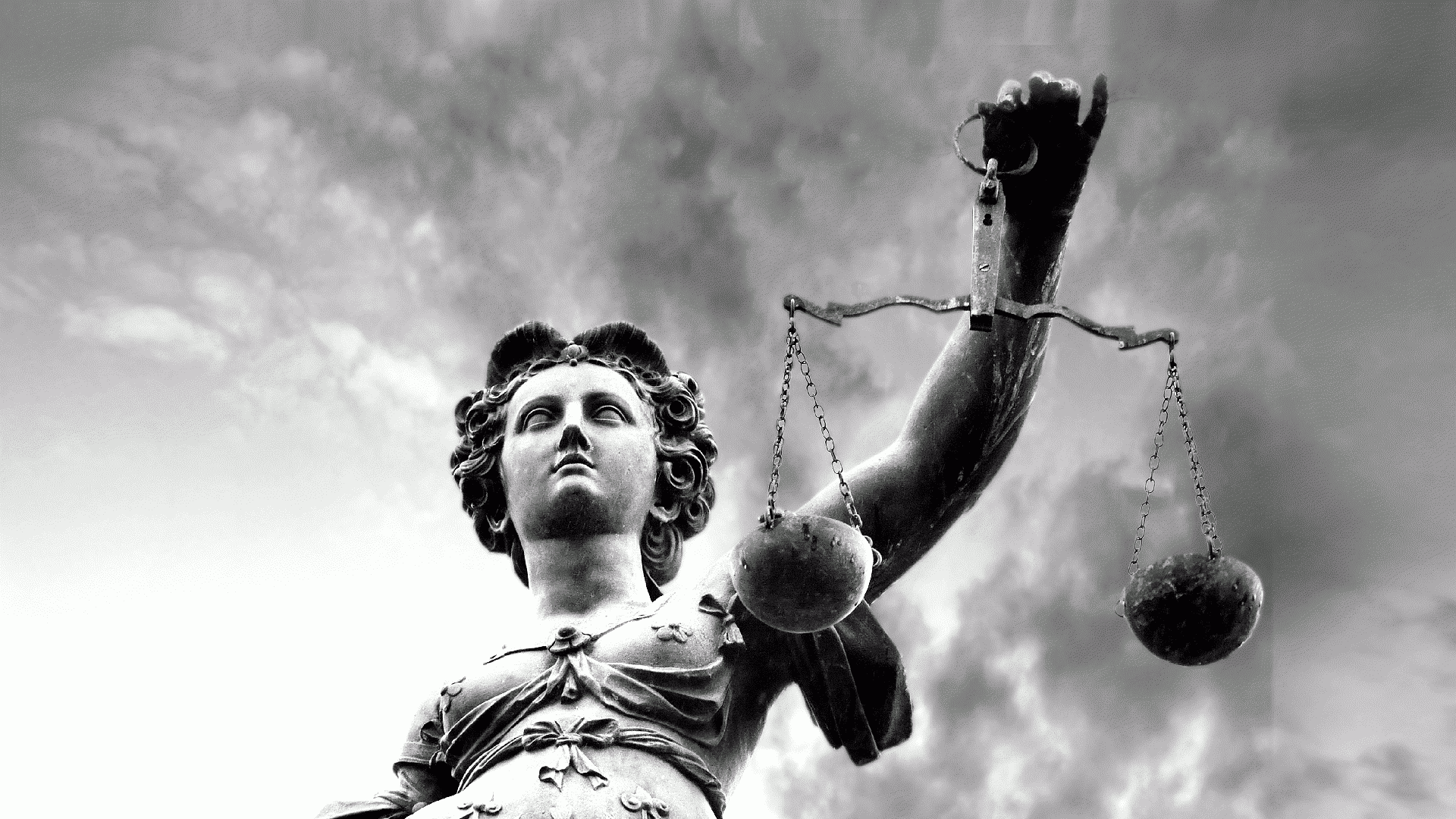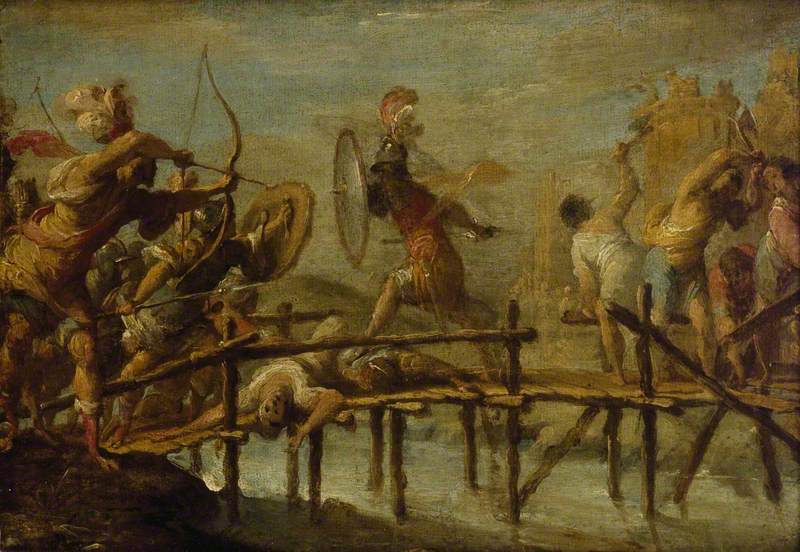America’s ideals are worth defending against two-bit impostors.
Who’s Afraid of the Common Good?

A response to C. Bradley Thompson.
C. Bradley Thompson, Clemson University’s BB&T-funded “libertarian in denial,” has once again come out swinging in these digital pages (and has since come out far, far, far, far, far, far, far, far more in these digital pages’ related Substack).
Thompson, a scholar at a major research institution who claims to have studiously considered, and have earnestly concluded, that America’s Founding was not in any way rooted in “authority, order, stability, community, social cohesion, continuity, solidarity, sacrifice, duty, law, orthodoxy, virtue, goodness, and God,” has most recently directed his liberalized ire at my friend Adrian Vermeule, Harvard Law School professor and provocative public intellectual. In his recent response to Vermeule’s widely read March 2020 jurisprudential salvo, “Beyond Originalism,” Thompson excoriates both Vermeule himself and the broader concepts of a legal and political regime oriented toward the common good.
Vermeule is fully capable of defending himself against Thompson’s colorful denunciation of him as a “dyspeptic enfant terrible.” Moreover, I have a difference of opinion with Vermeule as to the precise contours of the proper path forward for a genuinely conservative constitutional jurisprudence, as he and I have begun to hash out (and much more to come on that front).
But I object—as two other friends, Sohrab Ahmari and David Azerrad, have similarly done—to Thompson’s cartoonish, Ayn Rand-ian view of the American Founding. Thompson, impressive bona fides notwithstanding, misunderstands the nature of republican self-governance in the classical tradition—and he misunderstands the nature of our specific constitutional order. Most germanely, he misunderstands the conceptual intersection thereof: namely, the overarching nature of a legal and political regime oriented toward the common good. In truth, Thompson has needlessly frenzied himself over a rather anodyne and unthreatening phraseology. Indeed, if nothing else, I hope to aid my individual autonomy-fetishizing professorial interlocutor to sleep just a bit better at night.
Our libertarian friends tend to fret over the notion that government might have any positive, assertive role beyond an obsessive fixation with securing negative liberty at any and all costs. For those of this ilk, the idea that our actual political inheritance might entail “wielding ‘regime-level’ power in the service of good political order,” let alone “wielding the levers of state power…to reward friends and punish enemies (within the confines of the rule of law),” is anathema. This is not exactly a new debate, of course. But it has unfolded prolifically these past couple of years on the Right on issues as wide-ranging as “drag queen reading hour,” pornography regulation, and Big Tech corporate malfeasance (and everything in between). It will not end any time soon.
Thompson’s Map of Misreadings
Thompson’s view of the American Founding is predicated on elevating the Declaration of Independence—and interpreting it as dogmatic Lockean language about how “Governments are instituted among Men” to “secure” “certain unalienable Rights”—in such a way as to crowd out almost all other interpretations and sources.
Now, I agree with Justice Clarence Thomas—contra his late longtime senior colleague, Justice Antonin Scalia—that the Declaration has a real and meaningful role to play in constitutional interpretation. I was even born on Abraham Lincoln’s birthday and, as the Claremont Institute and its late founder, Harry Jaffa, have collectively dedicated more ink to explaining than anyone in modern American political life, it was Lincoln for whom the Declaration was the “apple of gold” around which the Constitution was but a “picture of silver”—and for whom the Declaration serves as an “electric cord” that “links…patriotic hearts as long as the love of freedom exists in the minds of men throughout the world.”
In short: no Declaration skeptic, I. But the story is quite a bit more complicated than what Thompson depicts.
“Electric cord” status notwithstanding, one cannot escape the rudimentary fact that the Constitution of 1787 was written under circumstances tangibly different than those surrounding the drafting of the Declaration in 1776. For one, Thomas Jefferson, the Declaration’s penman, was missing in action in 1787—ever the Francophile, he was gallivanting in pre-Revolutionary France—a perhaps-serendipitous absence that the late Gertrude Himmelfarb apparently once described as “the clearest sign of Providence intervening in American history.” Accordingly, James Madison, Jefferson’s once and future protégé, fell under the interstitial influence of the men who came to be the Federalist Party, led by Anglophilic, common good-oriented statesmen such as Alexander Hamilton.
In fact, those who would ultimately emerge as Federalists dominated the 1787 Constitutional Convention, something which we clearly see in the common good-centric language of the Constitution’s Preamble, drafted by the Convention’s Committee in Style, headed by the common good/nationalist-oriented Gouverneur Morris. The Preamble is the closest we might come to an express enunciation of the charter’s intent and purpose:
We the People of the United States, in Order to form a more perfect Union, establish Justice, insure domestic Tranquility, provide for the common defense, promote the general Welfare, and secure the Blessings of Liberty to ourselves and our Posterity, do ordain and establish this Constitution for the United States of America.
The careful reader will note that this language does not entail individual liberty as an end unto itself at all. Rather, the closest we come is the enumerated purpose of “secur[ing] the Blessings of Liberty,” wherein “Liberty” is an instrumental means toward the narrower end of “Blessings.” As Harry Jaffa once said:
…reflection teaches us that the possession of health, wealth, and freedom are not the ultimate measure of human well-being. We know that there have been human beings who, being in the full possession of health, wealth, and freedom, have yet committed suicide. Health, wealth, and freedom must be combined with something else before they become ingredients of the human good, before they become blessings, properly so called.
The idea of liberty—or the liberty which is a blessing—being an emancipation of the passions from moral restraint had no place in the constitutional doctrine of the novus ordo seclorum. The liberty which is a blessing must be good for the one who possesses it. It must therefore be a good in the sight of God, who is the source of blessings. Such a good must point to felicity, whether in this world or the next, as its consummation. By calling the advantages of liberty “blessings,” the Constitution, which in certain respects makes perhaps the most radical break in all human history with all that has gone before it, nonetheless, in its understanding of the connection between happiness and virtue, aligns itself decisively with traditional moral philosophy and moral theology.
As I have argued numerous times here, the Preamble, like the Declaration itself, ought to imbue the words of the Constitution with meaning and thereby help guide its interpretation. Thompson does something closely approximating the precise opposite; he not only tendentiously downplays the extent to which references to the “public good” abound in Madison’s Federalist #10, as Tony Woodlief explains, but he also seems to outright ignore Madison’s framing, in Federalist #57, of the “aim of every political constitution” as being “first to obtain for rulers men who possess most wisdom to discern, and most virtue to pursue, the common good of the society.”
And that’s Madison, who, if he did not attain Jeffersonian levels of unyielding devotion to rationalist abstraction, was at least certainly more individual liberty-maximizing than those who would become Federalist Party leaders. Indeed, one must presume Thompson would outright blench at the balancing act between prudence and dogma evinced by Hamilton’s 1791 Report on the Subject of Manufactures.
Thompson may claim with a straight face that American society was simply conceived as an “aggregation of individuals with rights,” but this is belied by historical reality. George Washington himself, for instance, cautioned in 1783 that “arbitrary power is most easily established on the ruins of Liberty abused to licentiousness.” Founding Father Edmund Randolph similarly warned that “licentiousness has…contributed as much (if not more) as any other cause whatsoever, to the loss of…liberties.” The common law of defamation, at least up until the erroneously decided 1964 Supreme Court case of New York Times Co. v. Sullivan, was quite robust: blasphemy and obscenity were, until then, often jailable offenses. It is borderline dishonest to view the American Founding as a pure exercise in classical liberal doctrine—as an unblemished exercise of rationalist abstraction in unipolar governmental form. That is simply not true.
Hostility to Religion
It is also not unreasonable to suspect whether there might be some deeply personal, distasteful motives at work here. One cannot help but wonder, after reading Thompson’s recent Substack essay series, whether Thompson has a peculiar, dark obsession with the Catholic Church, specifically. In his fifth essay, he lets this overtly anti-Catholic cat out of the bag: “I will not…under any circumstances, permit individuals whose own moral lives are organized around an institution defined by systemic pedophilia to lecture me on the need for personal or public morality. Such people have no moral authority from which to lecture anyone on the higher or common good.”
That is, in a word, grotesque. Similarly, in his second essay, Thompson advances the deceitful claim that America has a “de jure…practice of separation of church and State.” This is a manifestly ahistorical distortion of the Establishment Clause of the First Amendment, as Philip Hamburger has persuasively demonstrated, and no well-read individual possessing a modicum of familiarity with America’s Founding ought to bestow it legitimacy. But to speak of a “separation of church and state” is not merely to dabble in rank ahistorical dishonesty—it is also to employ a term, whether wittingly or unwittingly, with a uniquely anti-Catholic linguistic provenance.
Query what Thompson makes, then, of this specific critique coming from a very publicly Jewish essayist (yours truly). For that matter, query what Thompson might make of the fact that numerous highly prominent religious Jews are quite comfortable speaking in the rhetorical language of the common good.
Fear of the Common Good
This, then, takes us back to Thompson’s histrionic distress that Vermeule had the temerity to couch his criticism of foundering Originalism, Inc. in the phraseology of the common good. Setting aside Thompson’s ahistorical misunderstanding of the American Founding, he also badly misunderstands and dramatically embellishes the purported dangers of a political and legal regime oriented not toward the maximalization of individual liberty, but toward the common good of its citizenry.
Thompson is unduly fearful of the prospect that common-good governing might be employed as a fig leaf for majoritarianism run amok, and the tyranny of might over right. To be sure, majoritarian trampling of one group over another is a reasonable fear, in the abstract—it cuts to the core of Lincoln’s objections to Stephen Douglas’s morally denuded, proceduralist pleas for “popular sovereignty” in the Western territories, and it tugs at the heartstrings of earnest pro-lifers everywhere we can be found. But this, let alone melodramatic lamentations about “dog-eat-dog competition[s] for power,” makes a farcical straw man out of common good-oriented conservatism.
Rather, what we common good-oriented conservatives believe is very simple. We believe that individual liberty, let alone licentiousness or hedonism, is not the be-all/end-all of why governments are instituted among men. We believe that although individual liberty—especially religious liberty—might be an intrinsic end to a limited extent, it is more comfortably conceptualized as a means toward realizing the classical aims of politics qua politics: societal justice, human flourishing, and the common good of nation-state, communities, private institutions, and families alike. We believe, as Aristotle put it in his Politics, that “a state exists for the sake of a good life, and not for the sake of life only.” Elected statesmen and constitutional interpreters who take a common good-centric approach, therefore, prioritize the institutional and communitarian health that, contra the individual autonomy fetishists and laissez-faire fundamentalists, alone can lead to true human flourishing.
This is all that is meant. It does not mean that individual rights or freedom are unimportant, or ought to be wholly negated. Far from it. It is simply a different, non-dogmatic analytical prism—far more communitarian, far less individualistic—through which to view the roles, duties, and normative preferences of our public decisionmakers and legal expositors. It just so happens, as Chief Justice John Marshall showed us in the epochal 1819 case of McCulloch v. Maryland, that this is also our true inheritance—our true political economy, our true legal regime, and our true constitutional order.
There is nothing scary about this way of viewing the world, this way of viewing the rights of citizenry, and this way of viewing the duties incumbent upon the sundry constitutional actors in our system of governance. Thompson’s palpable fears about this anodyne, non-controversial set of political principles evinces either an extraordinarily doctrinaire, rigid form of libertarianism or a genuine ignorance as to the beliefs held by the majority of conservative-leaning thought leaders over the past few centuries who prioritize health of nation, family, home, and hearth over the maximalization at all costs of individual liberty.
Thompson can try his hardest to depict the American Founding as a libertarian revolution, but there is simply no plausible reading of men such as Tocqueville that would indicate the Founding-era creed as anything other than religious, family-centric, common good communitarianism.
Ours, then, is a much more traditional way of viewing the relationship between man and republican self-governance. Indeed, it is possible that there has never been a truly serious political thinker who has gone quite as far as Thompson has gone in making the claim that unvarnished maximalization of individual liberty is the singular end of a just and proper politics (and be it noted, Ayn Rand does not count as a truly serious political thinker).
Thompson is venturing into relatively unexplored terrain. To the extent he merely wishes to elevate the role played by the Declaration of Independence in our public political life, I genuinely wish him all the best. We would all do well to emulate Lincoln in that noble respect. But to the extent Thompson would condemn those of us who support any role for public officials whatsoever beyond merely the incremental expansion of negative liberty as inconsistent with either good political order or the principles of the American Founding, I would encourage him perhaps to write another book.
The American Mind presents a range of perspectives. Views are writers’ own and do not necessarily represent those of The Claremont Institute.
The American Mind is a publication of the Claremont Institute, a non-profit 501(c)(3) organization, dedicated to restoring the principles of the American Founding to their rightful, preeminent authority in our national life. Interested in supporting our work? Gifts to the Claremont Institute are tax-deductible.
We are inclined, but not fated, to decadence.
No perceptivity, no public-mindedness, no plan.
America once recognized the common—and highest—good.
Vitalist conservatism has more to offer than its critics let on.





